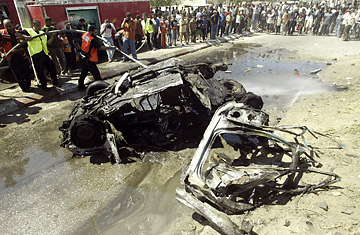
A Palestinian pours water on vehicles destroyed by an Israeli air strike in Khan Younis on June 17
Israel and its archnemesis Hamas have tentatively agreed to a truce, according to Egyptian authorities who brokered the cease-fire. Although the two sides refrained from direct talks, in indirect negotiations via Cairo they have, according to Egypt, agreed to implement a truce starting at 6 a.m. Thursday that will see an end to rocket fire from Gaza into southern Israel.
Several hours before the truce was announced, Israeli fighter planes fired missiles killing six suspected "terrorist operatives" inside Gaza, but that action is unlikely to stop the deal from going ahead. Under the first stage of the agreement, Hamas will stop militant groups from firing rockets into Israeli towns and communities near Gaza. In exchange, Israel will cease targeted attacks on militants like Tuesday's air strike.
The truce — which Israeli officials have so far declined to confirm or deny — marks a radical change for Israel. Until these Egyptian-sponsored indirect talks, Prime Minister Ehud Olmert, following the lead of the Bush Administration, had steadfastly refused to talk to Hamas on the grounds that it was a terrorist organization. But Olmert, whose popularity ratings are near zero, chose indirect dialogue with Hamas as a lesser evil. The other option — which may still happen if the truce fails — is for Israel to launch a major offensive in Gaza that would be costly in human life and even then would probably fail to crush Hamas. The incentive for Hamas to tamp down the confrontation is the promise of progress toward easing the economic siege that has crippled Palestinian life in Gaza.
The truce, once it takes effect, would bring relief to the Israeli towns near Gaza, which over the past year have been peppered by hundreds of rockets, killing several people and wounding dozens.
As part of the truce, say the Egyptians, Israel will also allow a partial lifting of the aid, trade and financial blockade imposed on Gaza by Israel and Western powers a year ago, after Hamas seized control of Gaza from Fatah forces loyal to Palestinian President Mahmoud Abbas.
The truce, or "period of calm," as both sides are calling it, will last only if Hamas can rein in the anarchic militias and militant cells in Gaza that are prone to launching rockets into Israel and attacking Israeli military patrols passing near the security fence around Gaza. In the past, Hamas has been either unwilling or unable to halt such attacks, but it now has committed itself to doing exactly that. Hamas insists that the militias in Gaza have, in fact, signed on to the agreement it has reached with the Israelis. Says an Egyptian Foreign Ministry spokesman: "Hamas will stop all military operations and hostilities."
Still, some Israeli officials warn that any calm achieved by the truce will be temporary. A senior military intelligence officer warned Knesset members on Tuesday that the truce was likely to be "fragile" and "short-lived." Hamas spokesman Sami Abu Zahari was similarly cautionary: "Hamas will keep its right to respond to any [Israeli] operation," he said. Another Hamas official, Fawzi Barghoum, hinted that the next 36 hours, before the truce goes into effect, could be deadly, warning that "from now until the zero hour, our hands will be free to do what we want."
But if the truce holds, talks would progress to a second stage, involving a possible release of kidnapped Israeli corporal Gilad Shalit in exchange for hundreds of Palestinians held in Israeli prisons. Also, Israel would consent to reopening Rafah, the main border crossing between Gaza and Egypt, allowing besieged Gazans a long-denied connection to the outside world. Despite the absence of fanfare or even handshakes — and despite the well-founded skepticism on both sides — this most fragile of cease-fires could yet lay the groundwork for a wary coexistence between Israel and Hamas.
— With reporting by Jamil Hamad/Bethlehem and Aaron J. Klein/Jerusalem
